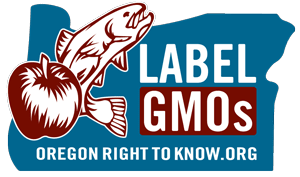EarthFix
by Cassandra Profita
 Undeterred by the failure of GMO labeling measures in Washington and California, advocate groups have launched a campaign to put a similar statewide measure on the November ballot in Oregon.
Undeterred by the failure of GMO labeling measures in Washington and California, advocate groups have launched a campaign to put a similar statewide measure on the November ballot in Oregon.
A group called Oregon Right To Know announced Thursday that it will be collecting signatures for an initiative that would require new labels on foods made with genetically engineered ingredients — often called genetically modified organisms or GMOs.
Among the campaign’s supporters are Food & Water Watch, the Center for Food Safety, OSPIRG and Whole Foods.
“We should have the right to choose whether we want to buy and eat genetically engineered food,” said Aurora Paulsen with the Center for Food Safety in announcing the petition.
The group will need to gather 87,213 valid signatures by July 3 to put the issue on the ballot in November.
David Rosenfeld, executive director of OSPIRG, said he’s not worried about getting enough signatures by the deadline, but he is bracing for a fight against opponents of the measure between now and November.
“We know from past experience that the big chemical companies that manufacture GMOs, like Monsanto and Dow, will spend millions to try to confuse the issue and block Oregon residents from being able to decide for themselves whether or not to eat GMOs,” he said. “Our side is not going to win by countering Monsanto dollar for dollar. We’ll win by talking to hundreds of thousands of Oregonians face to face, person to person, Oregonian to Oregonian. That’s what we’re going to do.”
Supporters of labeling genetically modified foods argue that there hasn’t been enough testing to ensure that GMOs are safe to eat, and that there are more environmental impacts from producing genetically modified foods such as water pollution from pesticide and herbicide run-off from farms. Thus, people should be able to identify GMO foods and choose whether or not to consume them.
Similar GMO labeling measures in Washington and California attracted large sums of money from opponents with deep pockets and were ultimately defeated. The Washington measure last year drew tens of millions of dollars in opposition from big brand names such as PepsiCo, Coca-Cola and Nestle, biotechnology companies and the Grocery Manufacturers Association — outspending supporters by a 2-to-1 ratio. The measure was defeated with 54 percent opposition.
In 2012, 53 percent of California voters said no to Proposition 37 after opponents spent $46 million to defeat it. Back in 2002, 71 percent of Oregon voters turned down another GMO labeling measure.
Oregon Right to Know has raised about $800,000 for the campaign so far, most of which came from Dr. Bronner’s Magic Soaps, Mercola Health and the Organic Consumers Association, according to spokesman Sandeep Kaushik.
Kaushik said supporters of labeling GMOs have learned from failed campaigns of the past. They’ve changed some of the language in the ballot measure itself in an attempt to avoid some of the arguments used to defeat earlier GMO labeling measures. For example, they made it clear that the initiative does not apply to pet food, an issue that he says gave opponents ammunition to use against the Washington GMO measure.

